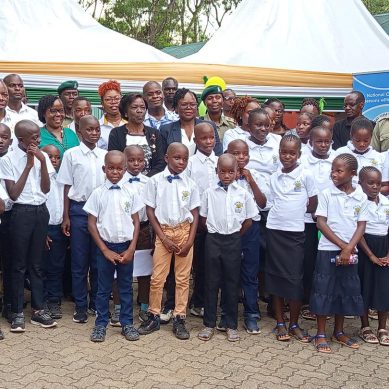
Universities, research centres, entrepreneurs and industry players have been told to collaborate in innovation and scientific research to drive national growth, solve pressing problems and strengthen competitiveness.
Speaking in Mombasa during the 4th Commercialisation and Entrepreneurial Institutions Leaders’ (CEIL) Summit organised by the Department for Science, Research and Innovation and the Kenya National Innovation Agency (KeNIA), Head of Public Service Felix Koskei said innovation and science turns knowledge into solutions, fosters entrepreneurship and secures sustainable and resilient futures.
“To succeed, we must break free from silos. Universities, research centres, entrepreneurs and industry must collaborate rather than compete in isolation,” Koskei said.
“We do not need to reinvent the wheel. We need to leverage on what we already have internally through our institutions of learning and externally through global partnerships and channel these capacities towards solving national and continental challenges,” he pointed.
The institutions of learning and researchers were challenged to ensure that research papers translate into production, enterprise, food sufficiency, better health outcomes and transformative mind-sets.
“We must think outside the box and, when necessary, create entirely new boxes,” Koskei challenged the forum.
He also advocated for the strengthening of repositories and observatories of knowledge, building up the National Research Fund and assessing Kenya’s position on the Global Competitiveness Index for Research and Innovation.
The Head of Public Service noted that there are encouraging signs in the endeavour, as the research-to-commercialisation programme (R2C) being spearheaded by the Kenya National Innovation Agency (KeNIA) in partnership with ViKtoria Ventures has shown that research can become viable.
The R2C has led to the creation of 18 enterprises, 220 jobs and over Ksh217 million mobilised, a clear testimony that when research outputs are connected to markets, it unlocks tangible and inclusive results.
“The task now is to scale up this model across universities, TVETs and other research centres. Commercialisation masterplans, technology transfer training and venture-building under the Network of Entrepreneurial Institutions’ Leaders (NEIL) must become the DNA of our institutions,” said Koskei.
He further noted that the ultimate measure of innovation is transformation and added science and research must not remain confined to laboratories or journals. “They must find expression in industries, in climate-smart agriculture, in improved healthcare and in digital solutions that uplift our people,” he said.
Koskei emphasised that innovation is no longer an option but the lifeblood of socio-economic transformation for the country and the continent.
ICT is one of the five pillars of the Bottom-Up Economic Transformation Agenda. President William Ruto has also established the Department for Science, Research and Innovation.
The department has a clear mandate: to provide policy leadership, coordinate research institutions, strengthen capacity, mobilise funding, guide knowledge and technology governance and ensure that investments in research lead to measurable impact.
The department, Koskei said, must become a watering hole for accountability and leadership; a place where ideas converge, duplication is eliminated and synergies are created.
KeNIA CEO Tonny Omwansa affirmed the agency’s commitment to catalyse the commercialisation of innovations from universities and research centres.
The agency is supporting 25 universities to unlock their entrepreneurial potential. Through the support, the institutions have reformed their policies, introduced innovation funding and started research commercialisation acceleration programmes.
Dr Omwansa said they have set up a Technology Transfer Office that has since piloted three innovations from three universities.
“There are several jobs that have been created as a result of that research commercialisation. Our target now is to scale up. Our goal is to have six ventures every six months over the next three years, as a demonstration that we are scaling up these numbers,” the CEO said. A Tell Media / KNA report / By Sadik Hassan







